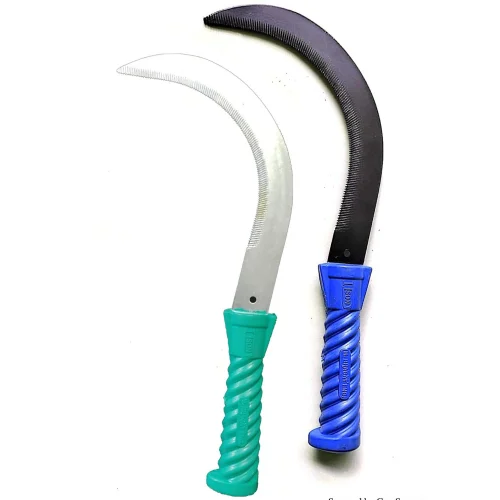13inch PVC Handle Hand Sickle
₹23.0
| Usage/Application | Agriculture |
| Brand | MBE |
| Model Name/Number | 3 REGULAR |
| Material | PVC (Handle) |
| Size | 13 Inch ( Length) |
| Blade Thickness | 1.5mm |
| Blade Material | Carbon Steel |
We V.V Manufacturer based in Rajkot Gujarat are Leading Manufacturer & Supplier of PVC / Plastic Agriculture Hand Sickel & Wooden Agriculture Hand Sickle and We can Supply All Over in India.
You must be logged in to post a review.
Q & A
Harvest management tools can contribute significantly to sustainability in agriculture by optimizing the harvesting process and minimizing waste. Here are some ways in which harvest management tools promote sustainability:
Efficient resource allocation: Harvest management tools help farmers plan and schedule their harvest activities more effectively. By analyzing crop maturity, weather conditions, and labor availability, these tools enable farmers to allocate resources efficiently, reducing unnecessary waste of time, labor, and energy.
Minimized crop loss: Accurate crop monitoring and prediction capabilities of harvest management tools help farmers harvest at the right time, avoiding overripe or underripe produce. This reduces post-harvest losses and improves overall yield, leading to better resource utilization and reduced food waste.
Reduced food waste: Harvest management tools enable farmers to identify and prioritize crops that are at risk of spoilage or damage. By focusing on these crops during harvest, farmers can salvage more produce and reduce post-harvest losses, ultimately reducing food waste.
Enhanced quality control: Harvest management tools allow for real-time monitoring of crop quality parameters such as size, color, and ripeness. By ensuring optimal quality standards during harvesting, farmers can deliver higher-quality produce to market, reducing the need for sorting, grading, and culling after harvest.
Sustainable transportation logistics: Efficient harvest management tools facilitate better planning of transportation logistics, such as optimizing routes, load distribution, and delivery schedules. By reducing travel distances and maximizing load capacity, these tools help minimize fuel consumption and greenhouse gas emissions associated with transportation.
Data-driven decision-making: Harvest management tools provide farmers with valuable data and insights regarding crop yields, quality, and market demand. This information allows farmers to make informed decisions about crop selection, production planning, and market targeting, leading to improved resource management and reduced waste.
It's worth noting that the sustainability of harvest management tools depends on several factors, including their accuracy, integration with other farming systems, and ongoing maintenance. Additionally, ensuring accessibility and affordability of these tools for small-scale farmers can further enhance their sustainability impact across diverse agricultural contexts.
General Inquiries
There are no inquiries yet.



















Reviews
There are no reviews yet.